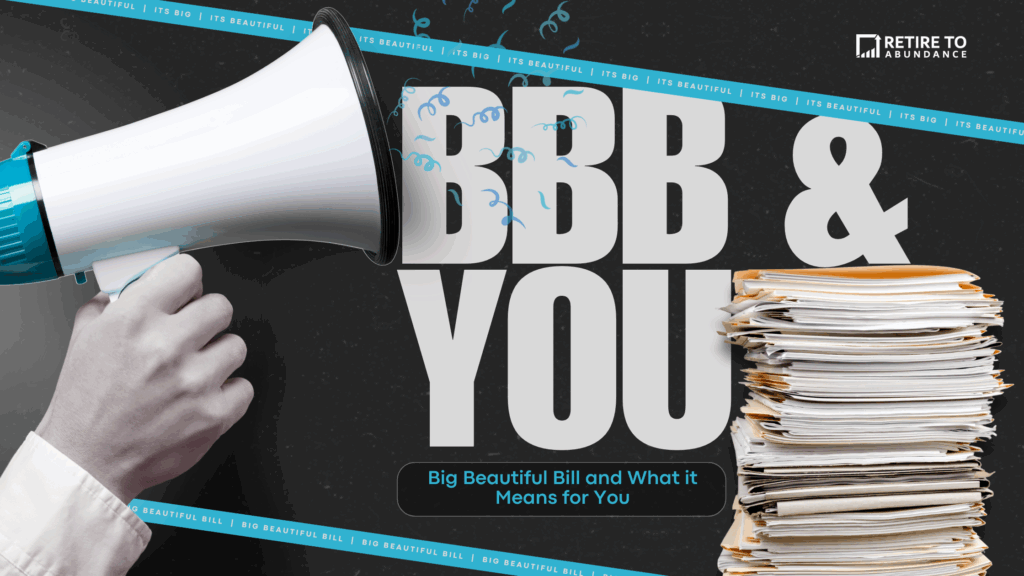Just how “big” and “beautiful” are these BBB changes for retirees? When Congress names a bill the “Big Beautiful Bill,” you know two things right off the bat:
- It’s going to be complicated.
- It’s not going to feel all that beautiful when you’re trying to figure out what it means for your taxes.
As a financial planner, I’ve had a steady stream of people asking, “So is this actually good news for retirees, or just political fireworks with a fancy name?” The short answer: it depends. The longer answer: yes… and also no… and also maybe.
So let’s dig into what the BBB really means for retirees and pre-retirees—and more importantly, what you can actually do about it while the window is open.
The New Senior Deduction
Let’s start with the most obvious headline: a new $6,000 deduction per person aged 65 or older. For a married couple, that’s an extra $12,000 off your taxable income each year.
It’s in addition to the standard deduction, which already gives older adults a little boost.
But of course, there’s a catch. Actually, two.
- It’s income-based. The deduction phases out between $75,000–$175,000 for singles and $150,000–$250,000 for joint filers.
- It’s temporary. This goes away after 2028 unless Congress acts again.
Still, for the right household, this deduction could mean $1,500–$2,000 in annual tax savings.
For many of my clients in the $90k–$140k income range, this is a real win. But you’ve got to be intentional about staying in that range to capture the full benefit.

Social Security Taxes: Not Repealed—Just Softened
Another misconception I’ve seen floating around is that this bill eliminates federal income taxes on Social Security benefits. It doesn’t.
The tax treatment of Social Security benefits remains the same. What’s changed is the number of people who might fall below the taxable thresholds because of the new senior deduction.
If your AGI plus half your Social Security benefit stays below $32,000 (joint) or $25,000 (single), then yes—you may not owe tax on your benefits. But if you’re taking IRA withdrawals, pension income, or even rental income, that cushion disappears fast.
So for most retirees, the strategy still matters:
- Manage taxable distributions carefully.
- Use Roth conversions (more on that in a moment).
- Consider Qualified Charitable Distributions (QCDs) if you’re over 70½ and giving to charity. These don’t count toward AGI and can keep you below taxation thresholds.
The Clock Is Ticking: 2025–2028 Is Your Window
The new deduction and most of the individual tax provisions sunset after 2028. So think of the next four tax years as a window of opportunity.
If you’re retired—or planning to retire soon—here are some questions to ask:
- Should I accelerate Roth conversions while I’m in a lower bracket?
- Should I delay Social Security to allow more room for strategic withdrawals?
- If I’m still working part-time, can I shift income into a later year to capture more of the senior deduction now?
- Can I bunch charitable giving utilizing donor-advised funds or consider QCDs?
A lot of folks assume once they hit retirement, the planning is over. But retirement is really just a new season of planning—and this bill gives you a few limited-time tools.

Long-Term Care & Medicaid: A Quiet but Serious Shift
One of the less publicized parts of the bill is the cut to federal Medicaid support and pressure for states to increase asset verification for long-term care eligibility.
That means if you’re counting on Medicaid to cover nursing home costs someday, you may have fewer options—and stricter rules—than previous generations.
Some states (Kansas included) are starting to implement real-time financial tracking and five-year lookbacks that are harder to navigate or “game.”
So what does this mean for retirees?
- Don’t assume Medicaid will be your backup plan.
- If you’re in your 50s or early 60s, consider long-term care insurance alternatives—even if just a small policy.
- Annuities or hybrid life + LTC policies may be worth a look.
- Talk to an elder law attorney before transferring property or setting up trusts.
You don’t have to spend your life savings in a nursing home—but you do need a strategy that takes these changes into account.
Estate Planning in the BBB: More Room to Work
One bright spot for those with significant assets: the federal estate tax exemption is increasing to $15 million per person ($30 million per couple) starting in 2026.
This doesn’t impact most families in Kansas or rural America—but if you own a large farm, ranch, or business, it’s something to keep in mind.
Even if you’re not anywhere close to $15 million, the current environment is a good time to:
- Review or update your will and trust.
- Consider gifting strategies to children or grandchildren.
- Make sure your beneficiary designations align with your wishes.
I’ve seen more than one family end up in probate court simply because they never updated an account or IRA beneficiary. Don’t let that be you.
Investment Considerations: Capital Gains, Dividends, and Tax Drag
While this bill doesn’t change capital gains rates directly, the broader shift in tax brackets and thresholds could affect how much of your investment income is taxed—especially if you’re straddling the phase-out range.
For example:
- You may want to harvest gains in low-income years while they’re taxed at 0%.
- Conversely, avoid realizing large gains if you’re about to lose the senior deduction.
- Don’t forget about the 3.8% net investment income tax on higher incomes—still in place.
And finally, don’t let taxes drive your entire investment strategy. But don’t ignore them either. The after-tax return is what matters in retirement.
Bonus Big Beautiful Bill Provisions to Keep on Your Radar
While the senior deduction and Social Security tax relief got all the headlines, there are a few other changes in the bill that could impact retirees—or their kids and grandkids.
- State & Local Tax Deduction Raised: The SALT cap temporarily increases from $10,000 to $40,000 for households under $500k in income. This mostly helps higher earners in high-tax states, but worth knowing if you’ve got significant property taxes.
- Car Loan Interest Deduction: Through 2028, interest on new U.S.-assembled car loans (not leases) is deductible—up to $10,000. If you’re buying a new car soon, timing it right could help.
- No New HSA Loophole for Medicare: Despite some early rumors, the bill does not allow Medicare enrollees to contribute to HSAs. However, if you’re still working and your spouse is on Medicare, you can still fund the family HSA if you’re on a qualifying plan.
- “Trump Accounts” for Newborns: Starting mid-2026, babies born between 2025–2028 may receive $1,000/year in a new kind of child retirement account. It’s a small perk, but might interest grandparents helping with legacy planning.
Let’s bring this to life with a few examples.

Examples: How This Impacts Real People
Early Retiree, Married, Age 62:
They’ve just stopped working and are living off cash and modest IRA withdrawals. They’re in a perfect window for Roth conversions, and the senior deduction will kick in three years from now. Strategic moves now could save them tens of thousands later.
Widow, Age 72, Living on Social Security + RMDs:
She’s right on the edge of where her Social Security starts getting taxed. A simple move like doing QCDs instead of taking standard RMDs could lower her taxes and keep her benefits from being taxed unnecessarily.
Retired Police Officer, 66, with KPERS + Side Income:
Between pension, rental income, and part-time consulting, their income puts them near the deduction phase-out range. Careful income timing and deferral strategies could preserve the full deduction for another few years. (Side note, if you want more KPERS specific retirement info, check out my website dedicated fully to retiring with KPERS.)
Final Thoughts: A Window, Not a Lifetime Change
The Big Beautiful Bill gives retirees and pre-retirees a few tools—but they come with an expiration date. From 2025 to 2028, you’ll have more room to maneuver. After that? We may be back to higher taxes and fewer deductions.
So the time to act is now. Review your income sources. Be strategic about what you draw and when. Think about your Roth strategy, your estate plan, and your healthcare risk. And most importantly, don’t assume that “retired” means “done planning.”
There’s a lot you can do—if you know where to look.
Need help reviewing your retirement tax picture or income strategy under the new rules? I’d be happy to talk.
This post is for education and entertainment purposes only. Nothing should be construed as investment, tax, or legal advice.

